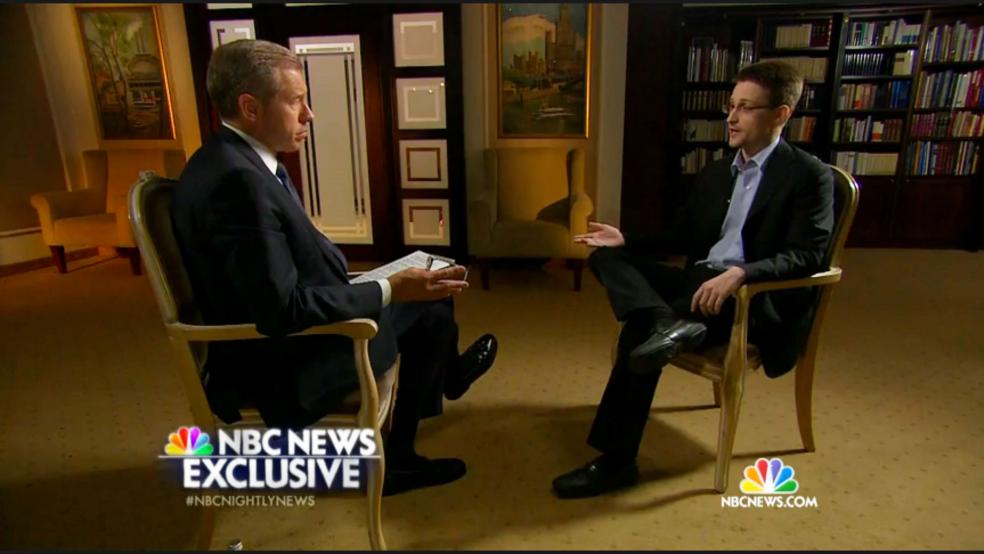Controversial NSA leaker Edward Snowden has spoken to the press before. Last night he took his act primetime, sitting down for an interview with NBC’s Brian Williams to defend his actions.
It’s the first time that many Americans will actually see and hear Snowden speak, and speak he does. Marking every third or four word with a crisp staccato for maximal effect - “I lived and worked UNDERCOVER … I AM a technical specialist. I don’t work with PEOPLE. I don’t work with AGENTS “- Snowden dismissed the notion that he was a low-level analyst. According to his own description of his work for American intelligence, Snowden was more of a cyber Jason Bourne, complete with the fake name and identity.
Related: Is Edward Snowden Working with the Russians?
“I was trained as a spy in sort of the traditional sense of the word in that I lived and worked undercover overseas — pretending to work in a job that I’m not — and even being assigned a name that was not mine,” Snowden said.
He also boasted quite a resume, despite never having graduated from college.
“They’re trying to use one position that I’ve had in a career here or there to distract from the totality of my experience which is that I’ve worked for the Central Intelligence Agency undercover overseas, I’ve worked for the National Security Agency undercover overseas and I’ve worked for the Defense Intelligence Agency as a lecturer at the Joint Counterintelligence Training Academy, where I developed sources and methods for keeping our information and people secure in the most hostile and dangerous environments around the world,” he said.
Snowden also denied being an agent of Russian intelligence and blamed the United States for this exile there.
Related: How Edward Snowden Could Derail the Global Economy
“The reality is I never intended to end up in Russia. I had a flight booked to Cuba onwards to Latin America, and I was stopped because the United States government decided to revoke my passport and trap me in Moscow Airport. So when people ask why are you in Russia, I say, ‘Please ask the State Department,” Snowden said without a hint of irony.
Outside of those who saw him via video link at SXSW, this is the first time many Americans will lay eyes on him. Those who believe he did the country a service will continue to believe that he exposed abuses against the U.S. Constitution. Those who believe he sparked an important debate but don’t like him personally won’t change their minds. Those who think he’s a traitor want him punished.
But the vast majority of people were probably wondering why they were watching Edward Snowden instead of Mariska Hargitay and the rest of the cast of Law & Order: SVU, even if it was a rerun. A year after Snowden’s initial revelations, the debate about surveillance has had little impact outside of media circles and academic elites.
The impact there has been entertaining. A New York Times book reviewer is in the middle of a very public spat with The New York Times public editor that has the New York publishing world riveted. The New Yorker published a review of the book by Glenn Greenwald, the controversial journalist to whom Snowden initially gave documents, that appears online but not in the book review. For his part, Greenwald has been condemning anyone who questions his motives as an enemy to journalism in particular and the free world in general.
Related: DOD's $5 Billion Push to Stop the Next Edward Snowden
Beyond that, Snowden’s revelations have hardly moved the needle. Polling on Snowden has been all over the map -- some show that Americans are happy they know the secrets he revealed. Others show that many believe he should be prosecuted. Yet others show that NSA programs help to catch terrorist more than they hurt Americans.
In other words, there is no single narrative on Snowden that the country can accept. Tonight’s interview is not like to change that, nor is it likely to raise the general public’s interest in the Snowden affair.
I’ve spent the last few months living outside of the Beltway. I can recount the Snowden saga in intricate detail, from his secret meeting with the Russians in China to Russian President Vladimir Putin granting him asylum. When I bring it up with people here -- who are among the most educated in the country -- most only know him as the guy that stole a bunch stuff from the government then disappeared, making President Obama very angry. None have changed their online habits. Life post-Snowden continued the way life did pre-Snowden.
Nor has the Obama administration changed much. In January, it announced that an outside organization would store the data collected by the NSA, and that there would be limits on the government’s access to it. But the vast majority of the NSA’s activities continue.
There is only one person I know who changed behavior because of Snowden. In October of last year, I traveled to Kenya to meet members of al Shabaab, an al Qaeda linked group that had pulled off a spectacular attack on an upscale mall in Nairobi a month earlier. One of the members, a man named Abdul, changed the SIM card on his mobile repeatedly. When I asked him why, he gave me a one-word answer:
“Snowden.”
Top Reads from The Fiscal Times





